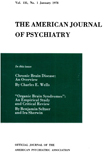THE EFFECT OF ELECTROSHOCK ON A "NORMAL" PERSON UNDER RECENT STRESS
Abstract
After an experimental application of electroshock a prior stressful event was disregarded—Stripped of its associative connections—in the manner consistent with the defensive operation known as isolation. Neutral events that occurred both before and after the stressful event were clearly remembered after the electroshock.
Clinical studies to be reported elsewhere (I) indicate that the arousal or enhancing of active defensive operations appears to be the most decisive effect of convulsive electroshock treatment. It is probably for that reason that ECT is helpful in those conditions in which defensive operations are at a low ebb, ineffective or exhausted, such as in depression and other severely regressive psychotic states, but that it is ineffective—in fact disturbing—in those conditions in which defensive operations are already too disturbingly alerted, constituting an obstacle to treatment and recovery, such as in anxiety states.
Access content
To read the fulltext, please use one of the options below to sign in or purchase access.- Personal login
- Institutional Login
- Sign in via OpenAthens
- Register for access
-
Please login/register if you wish to pair your device and check access availability.
Not a subscriber?
PsychiatryOnline subscription options offer access to the DSM-5 library, books, journals, CME, and patient resources. This all-in-one virtual library provides psychiatrists and mental health professionals with key resources for diagnosis, treatment, research, and professional development.
Need more help? PsychiatryOnline Customer Service may be reached by emailing [email protected] or by calling 800-368-5777 (in the U.S.) or 703-907-7322 (outside the U.S.).



